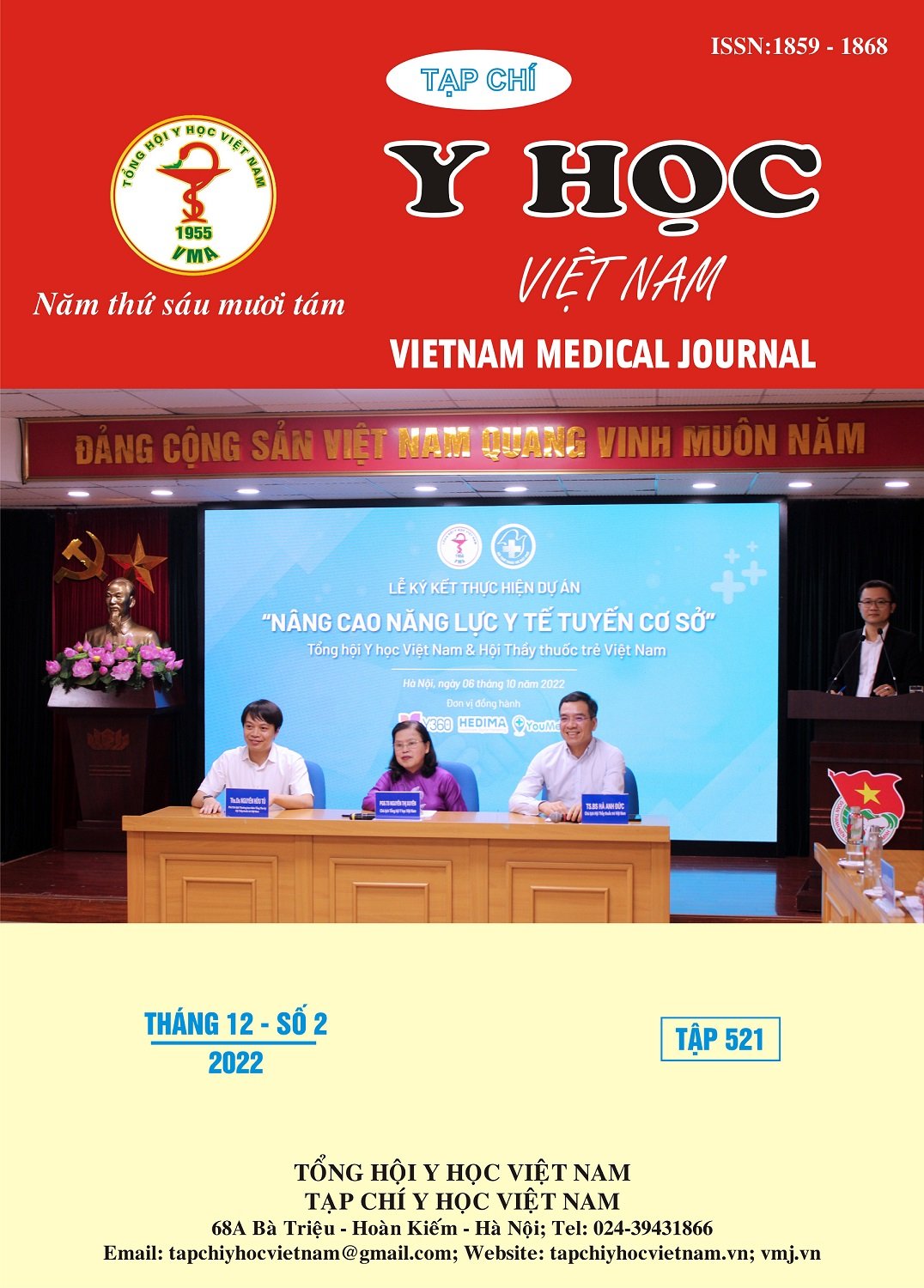FIRST-LINE OUTCOME TREATMENT THE FIRST-GENERATION TYROSINE KINASE INHIBITORS IN FEMALE PATIENTS WITH STAGE IIIB-IV NON-SMALL CELL LUNG CANCER
Main Article Content
Abstract
Objectives: To evaluate the results of the first-line therapy after the first-generation tyrosine kinase receptor inhibitors (TKIs) in female patients with non-small cell lung cancer (NSCLC) stage IIIB-IV. Subjects and methods: Regression study on 75 female patients with NSCLC stage IIIB-IV, harboring EGFR mutation, received 1st generation TKIs as first-line treatment at Bach Mai hospital from 2019-2021. Results: Partial response rate 76%, no patient had complete response. Disease control rate is 93,3%. Response to brain damage 59,1%. The response was higher in the group having the adverse event in the skin with both gefitinib and erlotinib (statistically significant). Prolonged progression-free survival was 12,5±0,6 months, median of 12 months. The prolonged progression-free survival median of two groups using gefitinib and erlotinib as first-line treatment is non statistical significance. The independent factors that have a good influence on prolonged progression-free survival are the whole state just before treatment: the ECOG PS value 0-1, the exon 19 mutation and adverse events in the skin (rash). Common adverse events were rash and diarrhea, the majority I and II. The rates of treatment discontinuation and dose reduction due to low toxicity were 2,7% and 1,3%.
Article Details
Keywords
Non-small cell lung cancer, female, EGFR mutation, Gefitinib, Erlotinib
References
2. Zhang YL, Yuan JQ, Wang KF, et al. The prevalence of EGFR mutation in patients with non-small cell lung cancer: a systematic review and meta-analysis. Oncotarget. 2016;7(48):78985-78993.
3. Đỗ Mai Linh, Lê Văn Quảng, Nguyễn Tuyết Mai. Đánh giá kết quả điều trị ung thư phổi không tế bào nhỏ bằng thuốc ức chế Tyrosine Kinase, Tạp chí ung thư học Việt Nam. 2017; 3: 86-93.
4. Fukuoka M, Wu YL, Thongprasert S, et al. Biomarker Analyses and Final Overall Survival Results From a Phase III, Randomized, Open-Label, First-Line Study of Gefitinib Versus Carboplatin/Paclitaxel in Clinically Selected Patients With Advanced Non–Small-Cell Lung Cancer in Asia (IPASS). JCO. 2011;29(21):2866-2874.
5. Zhou C, Wu YL, Chen G, et al. Erlotinib versus chemotherapy as first-line treatment for patients with advanced EGFR mutation-positive non-small-cell lung cancer (OPTIMAL, CTONG-0802): a multicentre, open-label, randomised, phase 3 study. The Lancet Oncology. 2011;12(8):735-742.
6. Kashima J, Okuma Y, Miwa M et al (2016), Survival of patients with brain metastases from non-small cell lung cancer harboring EGFR mutations treated with epidermal growth factor receptor tyrosine kinase inhibitors, Med Oncol. 33(11), 129.
7. Petrelli F., Borgonovo K., Cabiddu M. et al (2012). Relationship between skin rash and outcome in non-small-cell lung cancer patients treated with anti-EGFR tyrosine kinase inhibitors: a literature-based meta-analysis of 24 trials. Lung Cancer Amst Neth, 78(1), 8-15.
8. Urata Y, Katakami N, Morita S et al. Randomized Phase III Study Comparing Gefitinib With Erlotinib in Patients With Previously Treated Advanced Lung Adenocarcinoma: WJOG 5108L, J Clin Oncol. 2016; 24(27): 3248-57.


